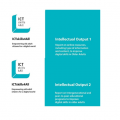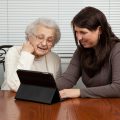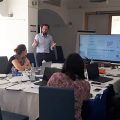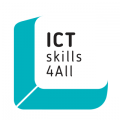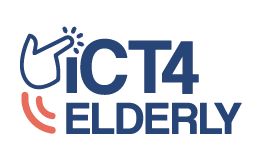
23 Sep ICT for the Elderly
23 Sep, 2018
PURPOSE AND ACTIVITIES
ICTs allow members of the growing elderly population to remain independent longer. The ICT 4 the Elderly project developed a pathway for up-skilling individuals between the age of 55 and 75 in digital competences and making them aware of some of the many opportunities that the Internet offers. They would then become ambassadors and train their peers (other elderly people) in digital skills that would facilitate their active ageing and inclusion in the (digital) society.
To do so, the project first collected best practices from other successful projects, and based on those, partners developed a training manual and an online academy. Then, individuals aged 55-75 were selected through a call for applicants to take part in the piloting as ambassadors of the project. Two pilot training sessions with 12 people each were foreseen to take place in Malta and in Berlin in Spring 2020, but just before the first one, the COVID-19 pandemic hit. Partners postponed the pilot training, hoping to organise it internationally. As the travel restrictions persisted, partners decided to organise the first pilot training session locally in each country. The pandemic also affected the possibility to organise face-to-face trainings locally. Some partners managed to organise those trainings in the Summer of 2020 (Switzerland), while others in Spring 2021 (Slovenia, Malta) The second piloting phase took place in Malta in September 2021 with 9 participants, as some of them were not about to travel due to COVID-19 restrictions.
Based on the results, Policy recommendations were produced for policy makers and training providers on how to improve policy and practice targeting elderly people.
PROJECT OUTCOMES
The project activities were divided into three Intellectual Outputs:
O1 – Collection of Best Practices and Open Educational Resources (OERs): the aim of the first output was to collect best practices, which have resulted from other projects, both EU and nationally funded. Every partner collected OERs resulted from other projects in their countries and beyond. Stiftung Digitale Chancen (SDC) lead this output.
O2 – Training Manual and Online Academy:
-The resources collected in Output 1 were used to develop the Online Academy which allows participants to study further. Ynternet.org Foundation was responsible for the Online Academy.
-In addition to developing the online platform, Output 2 foresaw the production of training materials on information technologies to be used during the training. Simbioza had the task to put together the training manual.
O3 – Production of recommendations for stakeholders and policy makers: ALL DIGITAL was in charge of the policy recommendations based on the results of piloting activities for further transferability and upscaling of the project results.
Malta Communication Authority, as a project coordinator, was responsible for the overall project management and quality control.
TARGET GROUP
This project addressed older adults aged 55-75 and over who have minimal or no engagement with digital technology. They were selected based on a call for applicants. The minimum requirements were to be able to speak English, to travel and to be enthusiastic. These participants had the role of project ambassadors during and after the project.
PROJECT PARTNERS
- Malta Communication Authority, Malta
- Simbioza Genesis, Slovenia
- Foundation Ynternet.org, Switzerland
- Stiftung Digitale Chancen, Germany
- ALL DIGITAL, Belgium



